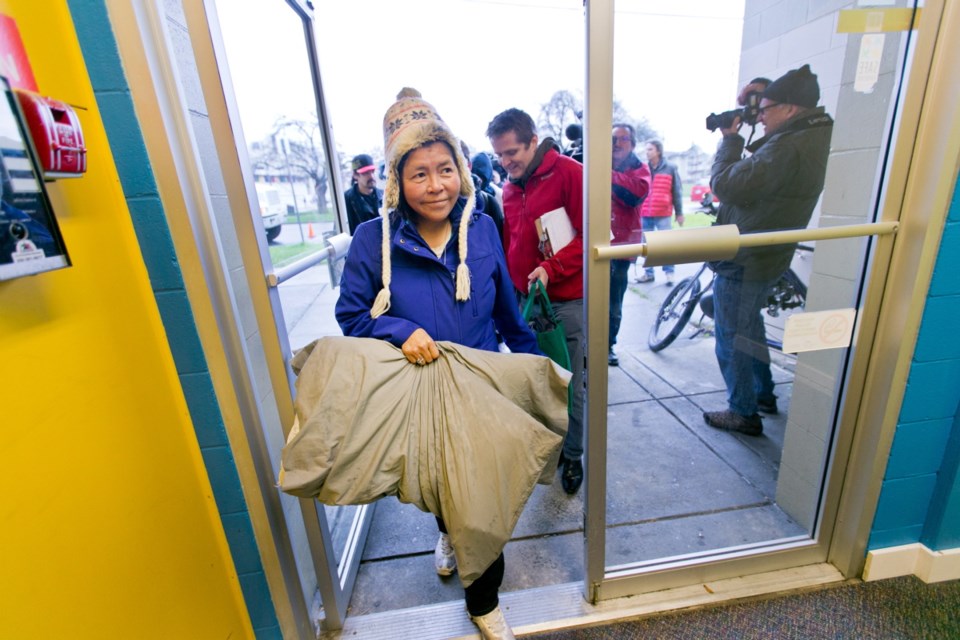Eric Lincoln wasn’t quite sure where he was going to hang his baseball cap on his new tent inside Victoria’s new homeless shelter on Yates Street.
Other than that, Lincoln, who had been camping on the lawn outside the provincial courthouse since mid-November, seemed pretty pleased with his new digs in the gymnasium in the old Boys and Girls Club.
“It’s indoors. It’s got security and three meals a day,” he said. “There’s TV and computers. Sounds like home to me.”
Lincoln was one of seven people who moved into My Place Transitional Home on Tuesday afternoon. Excitement filled the air as the first arrivals stepped out of a grey Our Place van and walked toward the building, carrying knapsacks, coolers and blankets.
Laurel Hanuse said it felt good to be moving inside after living outside for a year. “It’s a step ahead for us,” she said. “I’ve never smiled this hard.”
Her partner, John Bertrim, rolled a green suitcase down the sidewalk and shouted his thanks at Don Evans, the executive director of Our Place, the social agency operating the shelter: “Hey, Don. You’re doing a good thing.”
Our Place is working with B.C. Housing and Pacifica Housing to move the tenters into permanent housing, a process Evans said would start right away. “We’ll be working with all the community partners, Island Health, B.C. Housing, all the service providers so we can try to move people as fast as we can into housing.”
The My Place facility has room for 40 people. The majority who will live there have mental-health and addiction problems. Our Place decided to move the new residents in gradually to prevent chaos, said Evans.
“A lot have a lot of anxiety and we just want them to settle in slowly,” he said. “It’s also for staff to get acquainted with the building as well. It’s a pretty big, complicated building. We want to work out the bugs over the next week before we have a full house.”
Hanuse said she left her tent, sleeping bag and Coleman stove with a friend in the tent city to help him keep warm.
“He said: ‘Why don’t you want this?’ I said: ‘Because I’m positive being here we’re going to get a place before April 30,’ ” Hanuse recalled.
She and Bertrim explored their new tent and sleeping bags and unpacked their backpacks.
“I feel warm already,” Hanuse said. “I had to take my hat off. I’m not used to being inside.”
Bertrim was making himself comfy, feeling the warmth, walking around the gym in his socks.
“I was here for the meeting with the parents,” he said. “I understand their concerns that we’re beside a school. … But this is a step up. Where do you begin? Where do you start helping people? Where do you draw the line?”
Lincoln said his biggest hope is that he will find housing where family and friends can come and visit him. Becoming a resident of My Place will give him a foot in the door when it comes to accessing housing.
“I’ve been at Our Place for 16 months or more and not once did I get an interview for housing,” he said. “I have four months to figure it out. But I’m not going to give up. I’m not a quitter.”
The new residents spent the day meeting staff, finding out where they would shower and eat and getting to know each other.
“Most of them know each other from the tent city, but this is going to be a little different because they are going to be part of something and a little more actively involved in this,” Evans said.
Every resident is required to perform 10 hours of chores such as cleaning and meal preparation each week.
“I’m feeling relieved. I’m probably as excited as they are,” Evans said. “It’s been a lot of work and it’s nice to see the first people coming in. At first, it was hard to get people interested. But working with them the last few weeks has achieved something that people like and want.”
There are still a lot of campers outside, said Victoria Mayor Lisa Helps.
“Let me be perfectly clear: It’s provincial property. It’s a provincial responsibility,” Helps said of the courthouse tent city. “What the city will continue to do is work in collaboration with the province.”
The campers have forced the city to work with the province in a really meaningful way, she said.
“I can’t be more thankful for Mr. Coleman and B.C. Housing and the actions they have taken. What we’re looking to do as a city is continue to support the province in finding housing solutions — not just for the 80 people camped outside but for everyone in the region who needs a home.”



